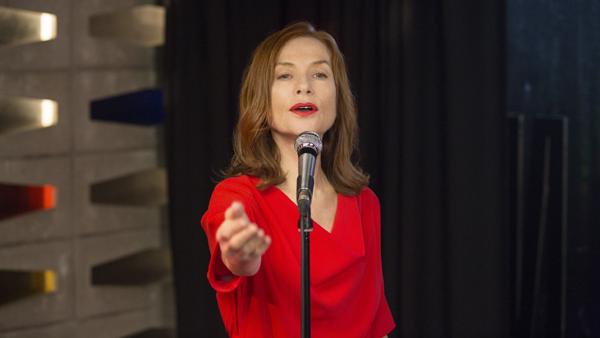Isabelle Huppert is having a singular career. A star since the mid-1970s, she appears in three films this year at the Toronto International Film Festival, including her acerbic, taking-no-prisoners performance in Paul Verhoeven’s Elle and in Mia Hansen-Love’s pensive Things to Come. In an about-face from the violent Verhoeven film, she also stars in the lighter-than-air musical melodrama of Bavo Defurne’s Souvenir.
Now 63, Huppert is navigating uncharted waters alone; well, at least compared to her English-speaking contemporaries. Here and in Elle, she’s unequivocally a romantic lead. It’s taken for granted that men of any generation find her desirable, and she desires back. Other actresses over 50 may also land multidimensional roles, but it has been a long time since any protagonist played by Meryl Streep or Helen Mirren, for example, went to bed with a smitten young man decades her junior. The script’s nonjudgmental approach to Huppert’s character, Liliane, is the most attention-getting element in this frothy, old-fashioned crowd pleaser. Indeed, the opening shot, a close-up of tiny water bubbles floating to the surface, sets up the movie’s fizzy but not entirely frivolous tone.
At her job at a food factory’s pâté assembly line, Liliane keeps to herself. But when a new guy—the blond, blue-eyed Jean (Kévin Azaïs)—begins his first day, he stands out as one of the few men in the entire plant; he’s also young (21), good looking, and fit. Of all the seating options in the cafeteria, he chooses to sit next to her.
Making small talk, he asks if her name is Laura because she looks just like a pop star from 30 years ago who went by that single-name moniker, and who almost won a European song contest, only to be defeated some band from Sweden, ABBA. He doesn’t believe her insistence that she’s not Laura (and as the audience learns, rightly so), and continues to approach her after work, begging her to perform for a private party.
Liliane clearly has some unfinished business regarding her former pop star career: She slugs whiskey after work alone as if it were apple juice and lives in an isolated time-warp, a 1970s-style earth-toned apartment, furnished with a clunky 30-year-old TV, a record player, and no computer in sight. She relents and agrees, more for Jean than as a step back into the limelight; he’s frequently filmed bathed in soft light, as though from Liliane’s softening and dewy point of view. Later, at home with his parents, who are roughly the same age as Liliane, Jean reports that his good looks sealed the deal.
The main conflict between the two main characters centers on their contrasting outlooks and circumstances—after their first night together, she makes Jean a lobster dinner, but he stands her up; he can’t get out of an obligation with his parents, who at this point don’t know the relationship is no longer platonic. However, the age difference takes a back seat to Liliane’s tentative, awkward attempts at a comeback that are at first urged on by Jean, who gives up his boxing aspirations to manage her.
The first half-hour presents an atypical point of view of someone who was once famous and then emphatically divorced herself from the scrutiny of the public and started anew, and sure enough, there’s some class snobbery regarding her fallen, working-class status. But any serious examination of the ramifications of instant fame followed by sudden anonymity gives way to the climax, the suspenseful and rousing singing competition. (It wouldn’t be hard to imagine this scenario as a vehicle for Lana Turner in a glossy early-1960s Ross Hunter production.)
The characters move along based on the demands of the story, and as a result, the film is more convincing as a celebration of kitsch than as a drama. The last 20 minutes are like watching the entire Eurovision Song Contest on fast-forward (which despite the unique European-ness of its gaudy competition, is not far off from the histrionics of American Idol in its heyday). As a chanteuse, Liliane’s languid pose, in which she stands rigidly in the spotlight with her hands on her hip, and her mezzo voice of a few notes recall Marlene Dietrich’s aloof stage persona and patter-style of singing. The notes may not sit right on the pitch, but both entertainers sure know how to sell a song.
The score by the Portland-based NPR favorites Pink Martini is a throwback to the late 1960s, when middle-of-the-road top 40 radio (think Peggy Lee or Herb Alpert) took its last gasp before rock music completely conquered popular culture. No matter your taste in music, it will wear you down until you can’t help but sing along to Liliane’s comeback anthem, an ode to a pretty young man. You won’t be able to get the song out of your head. (Believe me, I tried.)







CAN’T WAIT!! WILL WATCH NEXT WEEK IN RIO’S FILM FESTIVAL!!?